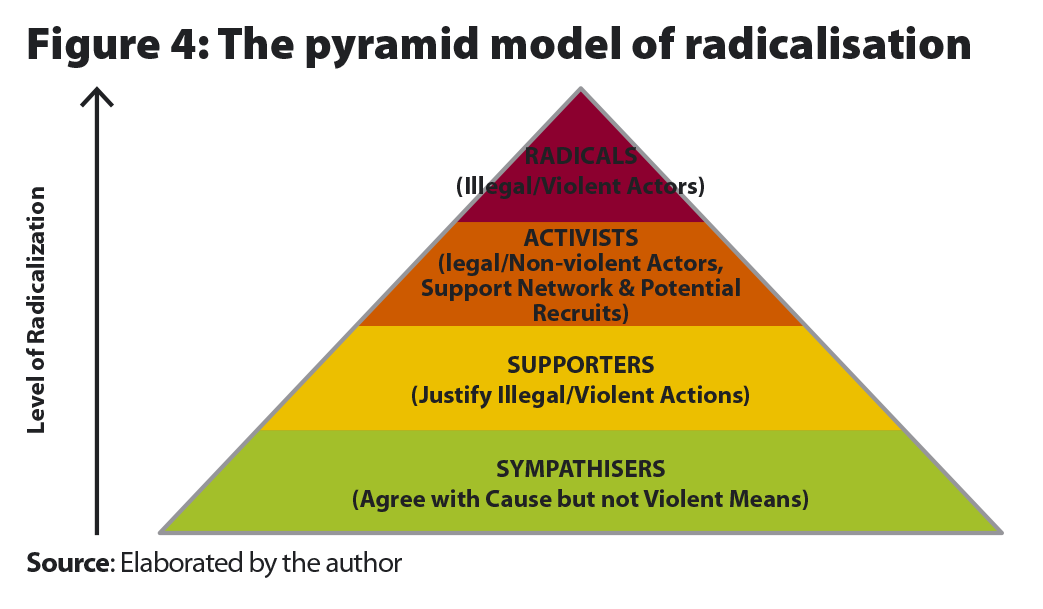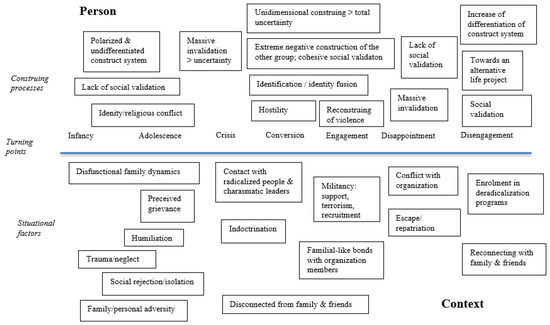Introduction
Extremism is a complex issue affecting societies globally, involving the adoption of radical beliefs that often reject mainstream values and can lead to harmful actions. Understanding why individuals embrace extremist views and how to address this issue is essential.
Read More- Media and Violence
What is Radicalization?
Radicalization is the process by which individuals adopt extremist ideologies that reject societal norms and may lead to violent or harmful behavior. This transformation is gradual, influenced by personal vulnerabilities and social factors (Moghaddam, 2005).

Examples of Radicalization
- Terrorism: Many individuals joining groups such as ISIS undergo radicalization by adopting extremist religious ideologies justifying violence (Horgan, 2008).
- Political Extremism: Radicalization can also occur around political ideologies, including ultra-nationalist or far-left movements, often motivated by perceived injustice (McCauley & Moskalenko, 2008).
- Online Radicalization: Social media has accelerated radicalization by exposing vulnerable individuals to extremist content and communities, such as white supremacist forums (Borum, 2011).

Why Do People Turn to Extremism?
Some of the reasons why people turn extremists include-
1. The Need for Identity and Belonging
Humans have a fundamental need for belonging and identity. When individuals feel marginalized or threatened, extremist groups may offer a strong sense of community and purpose, fulfilling these psychological needs (Tajfel & Turner, 1979).
2. The Desire for Certainty
Life’s uncertainty can be distressing, and some individuals have a low tolerance for ambiguity. Extremist ideologies offer clear, black-and-white narratives that simplify complex issues, providing comfort and certainty (Kruglanski et al., 2014).
3. Perceived Injustice and Grievances
Feelings of unfairness or oppression—whether personal or group-based—often motivate extremist attitudes. When peaceful change seems unattainable, radical actions can appear justified (Gurr, 1970).
How Does Radicalization Happen?

Radicalization unfolds through stages (Moghaddam, 2005):
- Exposure: Encountering ideas or events that challenge existing beliefs.
- Seeking Belonging: Identifying with groups that align with emerging grievances.
- Deepening Commitment: Through social influence or charismatic leaders, commitment intensifies.
- Action: Participation in extremist behaviors, sometimes violent.
Individual vulnerabilities combined with social and environmental contexts influence this progression.
Psychological Impact on Individuals
Extremism affects mental health and cognition:
- Cognitive Rigidity: Extremist beliefs encourage black-and-white thinking, limiting openness to alternative views (Stern, 2013).
- Emotional Strain: Fear, anger, and paranoia are common among extremists, especially when facing opposition or isolation (Bjørgo, 2011).
- Social Alienation: While offering community, extremist groups often isolate members from mainstream society, deepening social exclusion (McCauley & Moskalenko, 2008).
The Societal Consequences
Extremism threatens social cohesion and stability. Understanding psychological roots aids in crafting effective prevention and intervention strategies that focus on empathy and inclusion rather than punishment (Doosje et al., 2016).
Prevention and Intervention Strategies
Some of the preventive interventions include-
1. Promoting Critical Thinking and Media Literacy
Education enhancing critical analysis and media literacy reduces vulnerability to extremist propaganda (Klausen et al., 2019).
2. Encouraging Dialogue and Empathy
Facilitating conversations across groups helps reduce stereotypes and fosters empathy, weakening “us vs. them” mentalities (Bar-Tal, 2013).
3. Providing Mental Health Support
Addressing trauma and emotional needs through counseling can reduce susceptibility to extremist recruitment (Silke, 2008).
4. Offering Alternative Narratives
Counter-narratives promoting hope and resilience challenge extremist messaging and empower individuals to find meaning constructively (Horgan, 2014).
Conclusion
Extremism emerges from a complex interplay of psychological and social factors, including identity, certainty, and perceived injustice. Understanding these drivers is crucial for effective prevention and support. Through education, dialogue, and mental health resources, societies can build resilience against extremism and foster inclusion.
References
Bar-Tal, D. (2013). Intractable conflicts: Socio-psychological foundations and dynamics. Cambridge University Press.
Bjørgo, T. (2011). Dreams and disillusionment: Engagement in and disengagement from militant extremist groups. Crime Prevention and Community Safety, 13(1), 45–58.
Borum, R. (2011). Radicalization into violent extremism I: A review of social science theories. Journal of Strategic Security, 4(4), 7-36.
Doosje, B., Moghaddam, F. M., Kruglanski, A. W., de Wolf, A., Mann, L., & Feddes, A. R. (2016). Terrorism, radicalization and de-radicalization. Current Opinion in Psychology, 11, 79-84.
Gurr, T. R. (1970). Why men rebel. Princeton University Press.
Horgan, J. (2008). From profiles to pathways and roots to routes: Perspectives from psychology on radicalization into terrorism. The Annals of the American Academy of Political and Social Science, 618(1), 80-94.
Horgan, J. (2014). The psychology of terrorism (2nd ed.). Routledge.
Klausen, J., Kearney, M., & Law, D. (2019). Countering online extremism through education and media literacy. Journal of Political Psychology, 40(2), 97-110.
Kruglanski, A. W., Chen, X., Dechesne, M., Fishman, S., & Orehek, E. (2014). Fully committed: Suicide bombers’ motivation and the quest for personal significance. Political Psychology, 35(S1), 69-79.
McCauley, C., & Moskalenko, S. (2008). Mechanisms of political radicalization: Pathways toward terrorism. Terrorism and Political Violence, 20(3), 415-433.
Moghaddam, F. M. (2005). The staircase to terrorism: A psychological exploration. American Psychologist, 60(2), 161-169.
Silke, A. (2008). Holy warriors: Exploring the psychological processes of jihadi radicalization. European Journal of Criminology, 5(1), 99-123.
Stern, J. (2013). Terror in the name of God: Why religious militants kill. HarperCollins.
Tajfel, H., & Turner, J. C. (1979). An integrative theory of intergroup conflict. In W. G. Austin & S. Worchel (Eds.), The social psychology of intergroup relations (pp. 33–47). Brooks/Cole.
Subscribe to PsychUniverse
Get the latest updates and insights.
Join 3,045 other subscribers!
Niwlikar, B. A. (2025, June 1). What is Radicalization and 3 Psychological Reasons Why It Happens. PsychUniverse. https://psychuniverse.com/what-is-radicalization/



